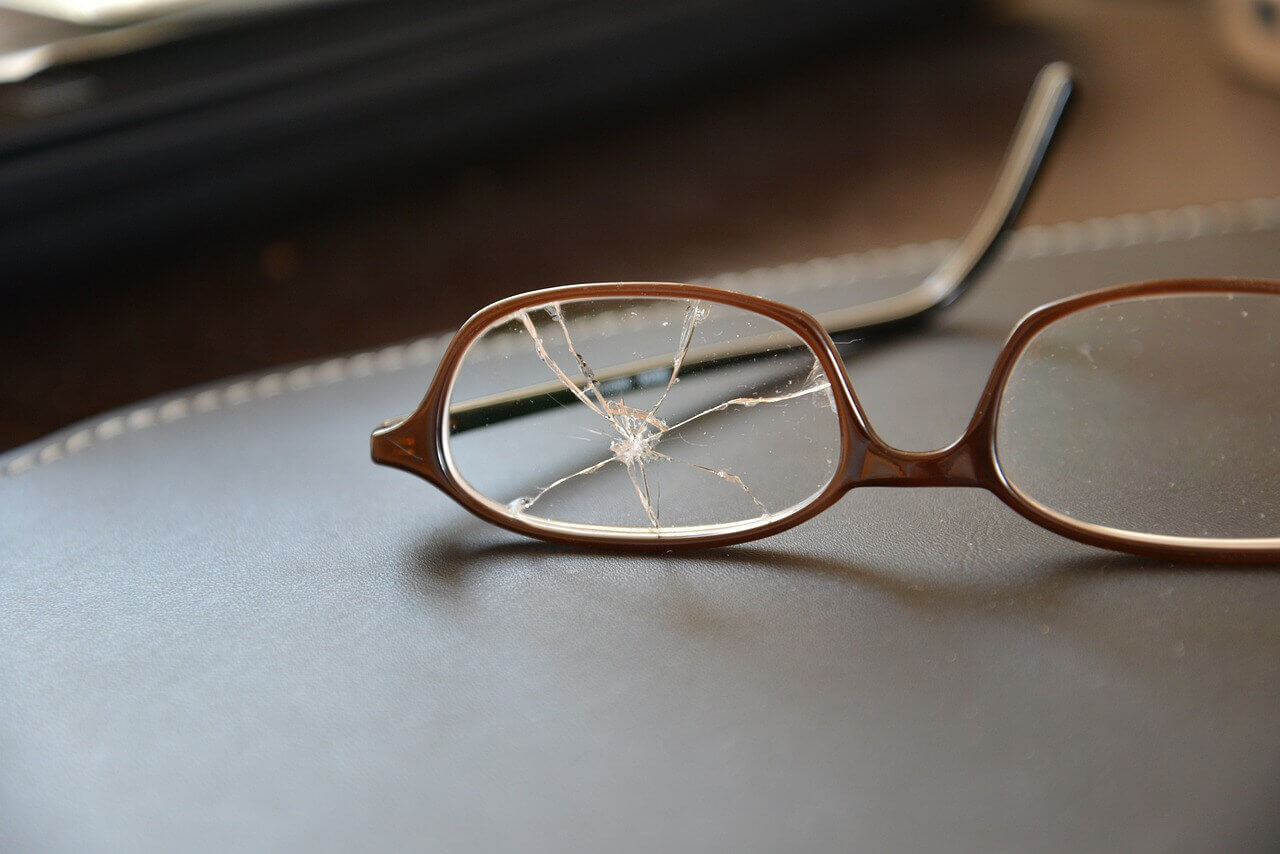7 step guide to a split lens
The lenses of your glasses can break, and a contact lens can split for many different reasons including wear and tear, manufacturing defects, poor handling, or physical stress. Regardless of what is the cause, when you experience a slit lens, whether in your glasses or a contact lens, it's important to approach the situation calmly and with care. Here's what you should do if your lens splits:
1. Prioritise Safety:
• Eyeglasses: If a spectacle lens cracks or shatters while you're wearing it, make sure you carefully remove your glasses without putting pressure on the lenses to prevent further damage. And avoid touching any sharp edges.
• Contact Lenses: If a contact lens splits or tears in your eye, do not rub your eye as this can cause further irritation or injury. Just blink several times to see if the lens naturally moves to a position where it can be easily removed.

2. Assess The Damage:
Take a moment to stay calm and try to closely inspect the full extent of the split. Is it a minor chip or a large crack? Are they wearable? Has your contact lens completely broken into two or more pieces, and have you removed all of the contact lenses?
3. Temporary Solutions:
• Eyeglasses: For small cracks, clear tape can serve as a temporary measure, but that’s all it is, unfortunately, temporary! Any cracks or chips in your glasses can be potentially harmful and or affect the clarity of vision offered by your glasses, so a quick fix is a great way to get you home, or to the optometrist but it's not a long-lasting solution.
• Contact Lenses: Unfortunately there's no quick or temporary fix for a torn contact lens. It's essential you discard it immediately to avoid eye injury or infection.
4. Backup Plan:
• Eyeglasses: If you have an old pair of glasses, even if they aren't your current prescription, they can be useful in emergencies. Until you can replace the split lens or get a new pair, these would suffice in an emergency for short-term use.
• Contact Lenses: Always keep a spare set of contact lenses or glasses handy. If one lens tears, you can easily replace it with a new lens or remove the other lens and switch to glasses without ruining your day completely.
5. Seek Professional Assistance:
• Eyeglasses: Visit your optometrist or re-order another pair online as soon as possible. Your optometrist can advise whether the lens can be repaired or if it needs a replacement. If your frame is damaged along with the lens, it might be time for a new pair of glasses.
• Contact Lenses: If you experience consistent tearing with your contact lenses, it could mean there is a problem with the lens batch, fit, or your handling technique. Consult the supplier of your contact lenses or your optometrist for recommendations. It is also worth performing a quick contact lens aftercare checkup at home
6. Prevention Is Everything:
• Eyeglasses: Ensure your glasses have a protective case and always handle them with care. Check the tightness of the screws regularly and make sure you choose lenses made of materials known for their durability, especially if you have an active lifestyle.
• Contact Lenses: Follow proper lens care procedures for insertion and removal. Always wash your hands before handling, use the recommended cleaning solution, and do not wear them beyond their intended period.
7. Consider The Cause:
- Eyeglasses: Did the lens split due to an accident? Or did it crack under seemingly normal conditions? If the glasses were dropped, sat on, or crushed, then breakage is to be expected. If you feel your lens broke for no real reason, then speak with your glasses provider to try and work out what happened.
- Contact lenses: Was the lens ripped when you took it out of the blister or storage case, or did the lens split while wearing it? Most cases of ripped or split lenses are due to handling error, either the lens has been folded, trapped, or scratched due to handling causing a flaw that may not be noticeable to the human eye, and then, due to the motion of blinking whilst wearing the lens, causes a tear.
If you experience a ripped or torn contact lens, always check with your optometrist if you feel some of the lens remains in your eye.
However, there are occasions when the fault can be traced back to a batch of lenses. Speak to your optometrist or lens provider if you feel there is a fault with your contact lens.
Conclusion:
A split lens, while inconvenient, doesn't have to be a major disruption to your day if there are no injuries caused. By taking immediate steps to ensure your safety and seeking professional guidance, you can get through the situation calmly and with ease. Regular check-ups with your optometrist and investing in quality eyewear can minimise the chances of facing such an event in the future.
Don't forget, if you have any worries or concerns, speak to your optometrist, or you can check out our Eye Help pages, which are available to everyone. However, if you order lenses from us, you will have access to our contact lens aftercare pages and our optometrist from within Your Account.

